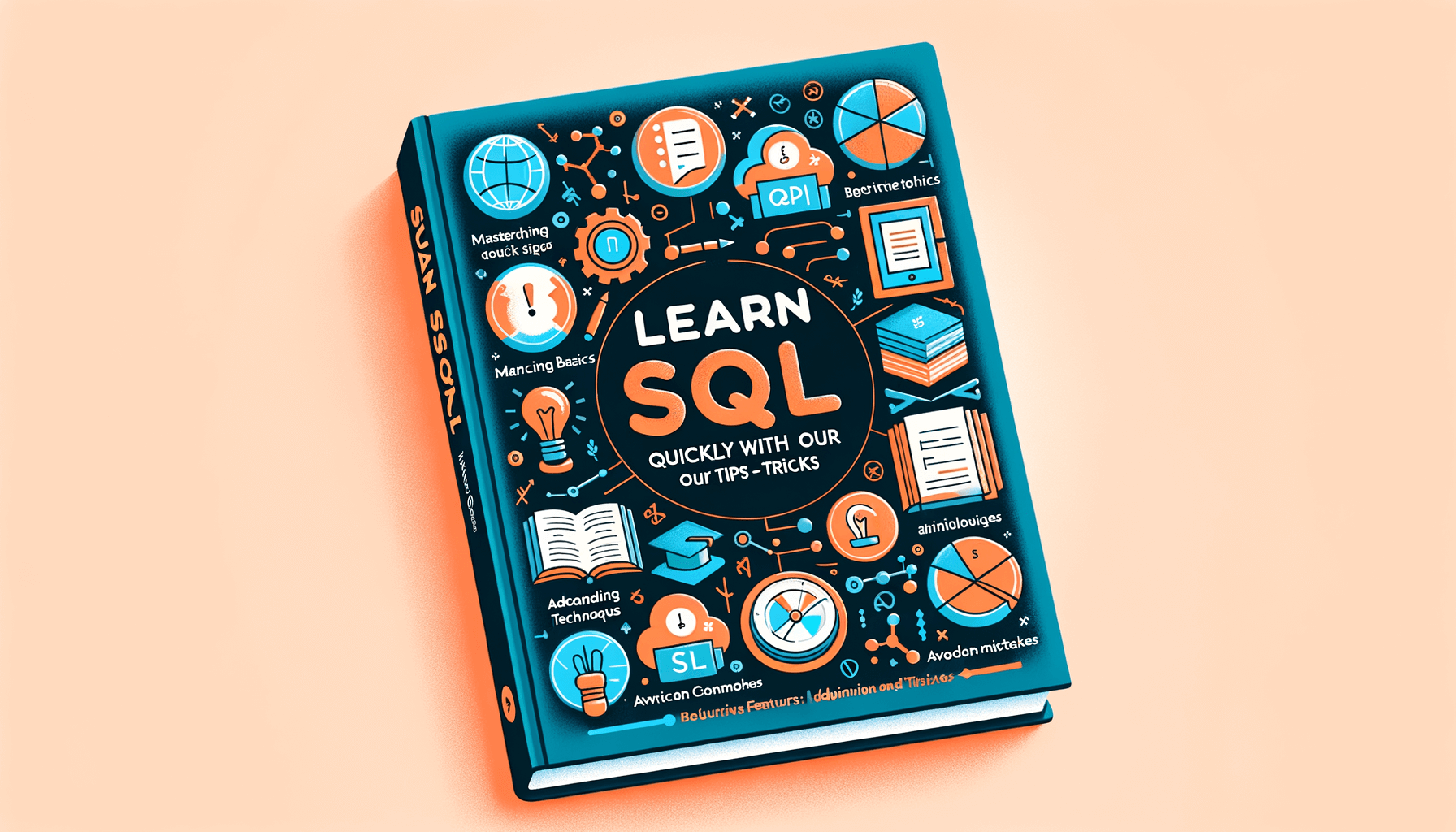A big variety of articles and resources

How can I learn SQL for data analytics in the most efficient way?
 Sia Author and Instructor
Learn SQL
Sia Author and Instructor
Learn SQL
12 minute read
SQL is a must-have skill for anyone looking to dive into data analytics. It's the go-to language for managing and querying data in databases. This article will guide you on how to learn SQL efficiently, covering everything from basic concepts to advanced techniques.
Key Takeaways
- SQL is crucial for data analytics and is widely used in the industry.
- Understanding basic SQL syntax and commands is the first step in learning SQL.
- There are many resources available, like books, online courses, and interactive tutorials, to help you learn SQL.
- Hands-on practice is essential for mastering SQL, so set up a SQL environment and work on sample databases.
- Advanced SQL techniques, like subqueries and window functions, are important for complex data analytics tasks.
Understanding the Importance of SQL in Data Analytics
Role of SQL in Data Management
SQL is the backbone of data management. It helps us store, retrieve, and manipulate data efficiently. Without SQL, managing large datasets would be nearly impossible. We use SQL to ensure data integrity and to perform complex queries that would be difficult with other tools.
SQL vs Other Data Query Languages
When comparing SQL to other data query languages, SQL stands out for its simplicity and power. While there are other languages like NoSQL, SQL remains the most popular due to its structured approach and ease of use. This makes it a preferred choice for many data analysts.
Industry Demand for SQL Skills
The demand for SQL skills in the industry is high. Companies look for professionals who can handle data effectively using SQL. By mastering SQL, we can gain a competitive edge in the job market. This is especially true in fields like Business Intelligence (BI), where practical skills enhancement is crucial.
Fundamental Concepts of SQL
Basic SQL Syntax and Commands
Understanding the basic syntax and commands of SQL is the first step in mastering this powerful language. SQL commands like SELECT, INSERT, UPDATE, and DELETE form the backbone of any SQL operation. These commands allow us to interact with databases, retrieve data, and make changes as needed. By learning these commands, we gain essential knowledge and versatility in tech.
Data Types and Structures
In SQL, data types and structures are crucial for organizing and storing information efficiently. Common data types include integers, strings, and dates. Knowing how to use these data types correctly ensures that our databases are both efficient and reliable. This foundational knowledge is essential for anyone looking to excel in data management.
Primary Keys and Foreign Keys
Primary keys and foreign keys are essential concepts in SQL that help maintain the integrity of our databases. A primary key uniquely identifies each record in a table, while a foreign key links records between tables. Understanding these keys is vital for creating robust and reliable databases. This knowledge not only boosts our confidence but also prepares us for real-world projects.
Mastering these fundamental concepts of SQL sets the stage for more advanced techniques and ensures immediate success in data management.
Choosing the Right Learning Resources
Books and Online Courses
When starting with SQL, selecting the right books and online courses is crucial. Books offer in-depth knowledge and can be a great reference. Online courses, on the other hand, provide interactive learning experiences. We recommend looking for courses that include video tutorials, quizzes, and hands-on projects.
Interactive SQL Tutorials
Interactive tutorials are a fantastic way to learn SQL. They allow us to practice writing queries in real-time and get immediate feedback. Websites like Codecademy and Khan Academy offer excellent interactive SQL tutorials that cater to beginners and advanced learners alike.
Community and Forums
Joining SQL communities and forums can be incredibly beneficial. These platforms allow us to ask questions, share knowledge, and learn from others' experiences. Popular forums like Stack Overflow and Reddit have active SQL communities where we can find answers to almost any SQL-related question.
Engaging with a community can significantly speed up our learning process and help us stay motivated.
Hands-On Practice with SQL
Setting Up a SQL Environment
To start practicing SQL, we need to set up a proper environment. This involves installing a database management system (DBMS) like MySQL, PostgreSQL, or SQLite. These tools are essential for running SQL queries and managing databases. Setting up a local environment allows us to experiment without any restrictions.
Sample Databases for Practice
Using sample databases is a great way to learn SQL. Many DBMS come with built-in sample databases like Sakila for MySQL or AdventureWorks for SQL Server. These databases provide a variety of tables and data to practice different SQL commands and queries. We can also find sample databases online to download and use.
Common SQL Exercises
Practicing common SQL exercises helps us understand different SQL concepts. Here are some exercises we can try:
- Selecting specific columns from a table
- Filtering data using WHERE clauses
- Grouping data with GROUP BY
- Joining tables using JOIN clauses
These exercises will help us become more comfortable with SQL and improve our data manipulation skills. For example, a mini course: sql data manipulation tools can help us dive into SQL grouping, filtering, and data preparation. This will gain advanced analytical skills and project readiness for real-world data science challenges.
Hands-on practice is crucial for mastering SQL. The more we practice, the better we get at writing efficient queries and solving complex data problems.
Advanced SQL Techniques for Data Analytics
Subqueries and Nested Queries
Subqueries and nested queries are essential for breaking down complex problems into manageable parts. They allow us to perform multiple steps in a single query, making our data retrieval more efficient. For instance, we can use a subquery to filter results before applying an aggregate function.
Window Functions
Window functions are powerful tools for performing calculations across a set of table rows related to the current row. Unlike aggregate functions, window functions do not collapse rows into a single result. This makes them ideal for running totals, moving averages, and ranking operations. Mastering window functions can significantly enhance our data analysis capabilities.
Common Table Expressions (CTEs)
Common Table Expressions (CTEs) provide a way to create temporary result sets that can be referenced within a SELECT, INSERT, UPDATE, or DELETE statement. They improve the readability and maintainability of complex queries. CTEs are particularly useful for recursive queries, which are essential for hierarchical data structures.
By mastering these advanced SQL techniques, we can tackle more complex data analytics tasks with ease and efficiency. This knowledge is crucial for anyone looking to advance their skills in data management and analysis.
Optimizing SQL Queries for Performance
Indexing Strategies
To make our SQL queries run faster, we need to use indexing. Indexes help the database find data quickly without scanning every row in a table. Choosing the right columns to index is crucial. Usually, we index columns that are often used in WHERE clauses or as join keys. However, too many indexes can slow down write operations, so we must find a balance.
Query Execution Plans
Understanding query execution plans is essential for optimizing SQL queries. These plans show us how the database executes a query, step by step. By examining the plan, we can identify bottlenecks and areas for improvement. Tools like EXPLAIN in MySQL or EXPLAIN ANALYZE in PostgreSQL can help us visualize these plans.
Avoiding Common Pitfalls
There are several common mistakes that can slow down our SQL queries. For example, using SELECT * instead of specifying columns can lead to unnecessary data retrieval. Also, not using joins properly or having poorly written subqueries can degrade performance. By being aware of these pitfalls, we can write more efficient SQL queries.
Optimizing SQL queries is not just about speed; it's about making our data retrieval processes more efficient and reliable.
Integrating SQL with Data Analytics Tools
SQL and Business Intelligence Tools
In the world of data analytics, SQL is a key player. It works well with many business intelligence (BI) tools. These tools help us turn raw data into useful insights. For example, we can use SQL to pull data from a database and then use a BI tool to create charts and reports. This makes it easier for everyone in the company to understand the data.
SQL in Data Visualization
Data visualization is another area where SQL shines. By using SQL, we can get the exact data we need for our visualizations. This is important because good visuals can make complex data easier to understand. Tools like Tableau and Power BI let us write SQL queries to get the data we need. Then, we can use these tools to create graphs and charts that tell a story.
Connecting SQL with Python and R
Python and R are popular programming languages in data analytics. They are often used for tasks like data cleaning and statistical analysis. SQL can be used with both of these languages to make our work easier. For example, we can use SQL to get data from a database and then use Python or R to analyze it. This combination is very powerful and is used by many data analysts.
SQL is a key skill for any data analyst. It helps us get the data we need and works well with many tools we use every day. Whether we are creating reports, making visualizations, or analyzing data, SQL is an important part of the process.
Real-World Applications of SQL in Data Analytics
Case Studies from Various Industries
In the healthcare sector, SQL helps in managing patient records and analyzing treatment outcomes. Retail companies use SQL to track inventory and understand customer buying patterns. Finance professionals rely on SQL to detect fraud and manage transactions. These examples show how SQL is essential across different fields.
SQL for Big Data Analytics
When dealing with large datasets, SQL is a powerful tool. It helps in querying and managing big data efficiently. Companies use SQL to analyze user behavior, which helps in making data-driven decisions. This is crucial for businesses aiming for growth.
SQL in Machine Learning Pipelines
SQL plays a key role in machine learning workflows. It helps in preparing and cleaning data before feeding it into machine learning models. This ensures that the data is accurate and reliable. SQL also helps in storing and retrieving model results, making the entire process smoother.
Preparing for SQL Certification Exams
When getting ready for SQL certification exams, we need to focus on the essential aspects of SQL knowledge. Understanding the key concepts and practicing regularly are crucial for success. It's important to explore various study resources and engage in mock tests to assess our readiness. Additionally, seeking guidance from experienced professionals can provide valuable insights and tips for effective exam preparation. Remember, practice and persistence are key to mastering SQL skills for certification exams.
Staying Updated with SQL Trends and Updates
Latest SQL Features and Versions
To stay current with SQL, we need to keep an eye on the latest features and versions. New updates often bring powerful tools that can make our work easier and more efficient. It's important to regularly check for updates from major SQL vendors like Oracle, Microsoft, and MySQL.
Following SQL Blogs and News
Reading SQL blogs and news sites helps us stay informed about the latest trends and best practices. Many experts share their insights and tips, which can be very helpful. We should subscribe to a few reputable blogs and set aside time each week to read them.
Participating in SQL Conferences and Meetups
Attending SQL conferences and meetups is a great way to learn from others and share our own experiences. These events often feature talks from industry leaders and provide opportunities for networking. We can find local meetups through platforms like Meetup.com or attend larger conferences like SQL PASS Summit.
Staying updated with SQL trends and updates is crucial for maintaining our skills and staying competitive in the field. By keeping up with new features, following expert advice, and engaging with the community, we can ensure we are always at the forefront of SQL technology.
Keeping up with the latest in SQL is crucial for anyone looking to stay ahead in tech. Our website offers a range of courses designed to boost your skills and career prospects. Whether you're a beginner or looking to advance, we have something for you. Don't miss out on the opportunity to learn from experts and get personalized guidance. Visit us today to explore our offerings and start your journey to becoming a SQL pro!
Conclusion
Learning SQL for data analytics can seem hard at first, but with the right steps, it becomes much easier. Start with the basics and practice regularly. Use online resources and join study groups to stay motivated. Remember, hands-on practice is key. By following these tips, you can become good at SQL and use it to analyze data effectively. Keep learning and practicing, and soon you'll be confident in your SQL skills.
Frequently Asked Questions
What is SQL and why is it important for data analytics?
SQL stands for Structured Query Language. It's used to manage and analyze data in databases. For data analytics, SQL helps you get the data you need quickly and easily.
How does SQL compare to other data query languages?
SQL is the most popular language for querying databases. Other languages like NoSQL are used for different types of databases, but SQL remains the standard for relational databases.
What basic SQL commands should I learn first?
Start with commands like SELECT, INSERT, UPDATE, and DELETE. These are the building blocks for working with data in SQL.
Are there any good books or online courses to learn SQL?
Yes, there are many great resources. Books like 'SQL for Dummies' and online courses from websites like Coursera and Udemy are very helpful.
How can I practice SQL on my own?
You can set up a SQL environment on your computer and use sample databases to practice. Many websites also offer interactive SQL exercises.
What are some advanced SQL techniques for data analytics?
Advanced techniques include subqueries, window functions, and common table expressions (CTEs). These help you perform more complex data analyses.
How can I make my SQL queries run faster?
You can use indexing strategies, check query execution plans, and avoid common mistakes to make your SQL queries run faster.
Are there SQL certifications I can get?
Yes, many organizations offer SQL certifications. These can help you prove your skills to employers and advance your career.
Related Articles

Can I learn SQL fast enough to get a job next week using it?
12 minute read

Discover the Best Website to Learn SQL in 2023
9 minute read





